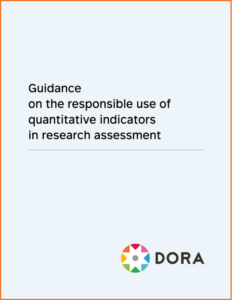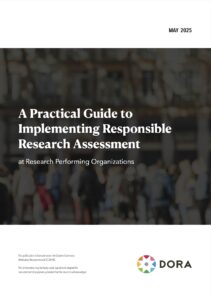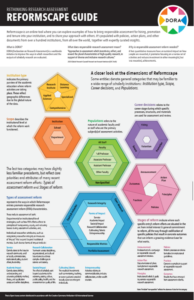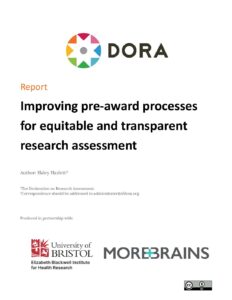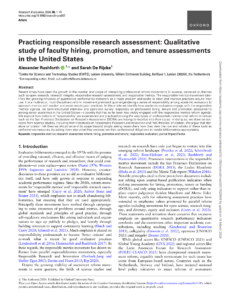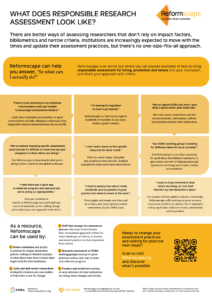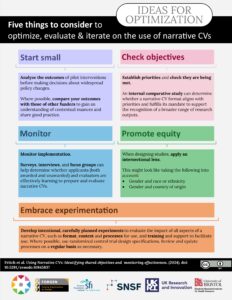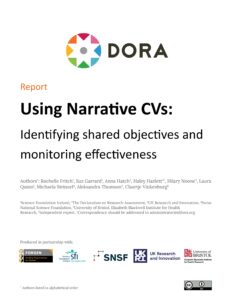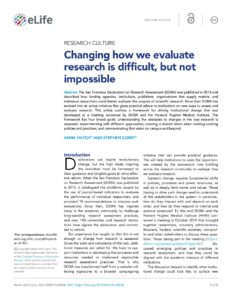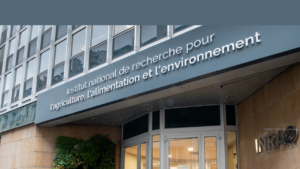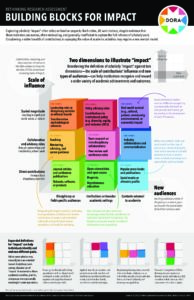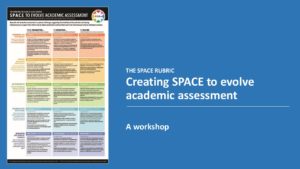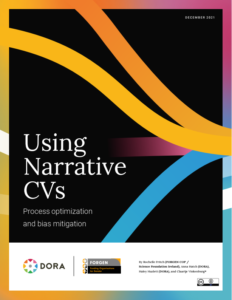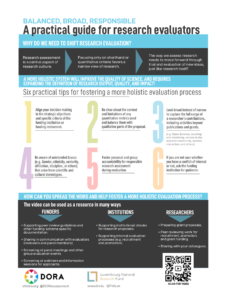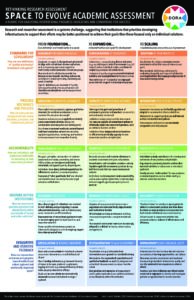A collection of materials to facilitate the development of responsible research and researcher assessment policies and practices.
Search and Filter
Resource type
Intended audience
Advocacy resourcesPolicies and guidancePosition papers
DORA-produced
For: FundersJournals and publishersProfessional societiesResearch institutesResearchers
2024
This document provides guidance on the use of several indicators (sometimes called metrics) used in research assessment: the Journal Impact Factor and other measurements of journals, citation counts, h-index, field-normalized citation indicators, and altmetrics. Five principles guide the use of these metrics: be clear, be transparent, be specific, be contextual, and be fair.
Advocacy resourcesPolicies and guidanceTools
DORA-produced
For: Research institutes
2025
"A Practical Guide to Implementing Responsible Research Assessment at Research Performing Organizations" provides action-oriented guidance, resources, and illustrative examples, for research performing organizations (RPOs) who are looking to shape and deliver responsible research assessment (RRA) practices. This includes RPOs who are looking to create an RRA strategy, organizations wanting to reform existing practices, and organizations simply wanting to take steps towards more holistic and inclusive approaches to research assessment.
Case studiesGood practicesInitiativesPolicies and guidance
DORA-produced
Aalborg University (AAU) in Denmark has embarked on an ambitious reform of its research assessment practices, aiming to move beyond traditional journal-based metrics and towards a more holistic and mission-driven approach. As an institution committed to problem-based learning and interdisciplinary collaboration, AAU sought to align research evaluation with its broader strategic goals. With approximately 3,200…
Case studiesGood practicesInitiativesPolicies and guidance
DORA-produced
In January 2021, the University of Calgary was the first Canadian university to sign DORA, cementing an ongoing commitment to societal impact, recognition of diverse forms of scholarship, Indigenous engagement, equity, diversity and inclusion and rigorous assessment and reporting of impact to parties within and beyond the University. The process of implementing DORA has been a…
Case studiesGood practicesInitiativesPolicies and guidance
DORA-produced
The University of Tokyo, established in 1877, is Japan’s oldest and largest national university, with three main campuses: Hongo, Komaba, and Kashiwa. The university’s major research areas span a wide range of disciplines, including natural sciences, engineering, social sciences, humanities, and interdisciplinary fields. In 2023, UTokyo became the first Japanese university to sign DORA. This…
Case studiesGood practicesInitiativesPolicies and guidance
DORA-produced
In 2022, the Department of Psychology at the University of Maryland underwent a complete overhaul of their evaluation policies, stemming from their motivation to address reproducibility issues in the field and develop more transparent and inclusive evaluation policies. The department chair began this process with DORA’s principles in mind, working alongside administration, faculty, and a…
Policies and guidanceTools
DORA-produced
For: Research institutes
2024
A one page tool that describes the six ways that entries are characterized in the Reformscape dataset. 1. Institution type. 2. Scope. 3. Populations. 4. Career decision. 5. Type of assessment reform. 6. Stages of reform. Part of "Rethinking research assessment" series.
Position papers
DORA-produced
For: Funders
This is a short report summarizing the key takeaways from a workshop co-organized by the San Francisco Declaration on Research Assessment (DORA), the University of Bristol, Elizabeth Blackwell Institute for Health Research, and the MoreBrains Cooperative. The aim of the online workshop was to develop actions to improve the processes that take place before research is…
Good practicesJournal articles
DORA-produced
For: Research institutes
2024
This paper investigates the processes and criteria involved in faculty hiring, promotion, and tenure assessments within academic institutions in the United States. Considering the relative size of the United States and its worldwide standing in academic research, there has been less public commitment to reforming research assessment from American research institutions than in similarly positioned…
Tools
DORA-produced
For: Research institutes
2024
This small, letter-sized poster (A4 paper) describes how you can use Reformscape to explore examples of responsible research assessment and help visualize what changes in policy toward responsible research assessment look like. This poster provides nine possible situations in which Reformscape can provide information, and describes five groups who might want to use Reformscape. DORA.…
Tools
DORA-produced
For: FundersResearch institutes
2024
This one-page tip sheet is a part of the short report Using Narrative CVs: Identifying shared objectives and monitoring effectiveness. In February 2022, DORA organized the online workshop series “Using Narrative CVs: Identifying shared objectives and monitoring effectiveness” in partnership with FORGEN CoP, Science Foundation Ireland, the Swiss National Science Foundation, UK Research and Innovation,…
Position papers
DORA-produced
For: FundersResearch institutes
2024
In February 2022, DORA organized the online workshop series “Using Narrative CVs: Identifying shared objectives and monitoring effectiveness” in partnership with FORGEN CoP, Science Foundation Ireland, the Swiss National Science Foundation, UK Research and Innovation, and the University of Bristol, Elizabeth Blackwell Institute for Health Research. The aim of the workshop was to develop a…
Journal articles
DORA-produced
For: FundersResearch institutes
2020
Based on discussions at a meeting DORA co-sponsored with the Howard Hughes Medical Institute in October 2019, DORA developed a framework for driving institutional change.
Case studies
DORA-produced
INRAE is a public research institute in France that promotes cohesive and sustainable development of agriculture, nutrition, and the environment. INRAE has implemented several different initiatives focused on advancing researcher evaluation and providing strong support for open science. The evaluation of individual researchers at INRAE is a two-way process conducted by both the organizational hierarchy…
Advocacy resourcesTools
DORA-produced
For: Research institutes
This is part of DORA’s toolkit of resources to support academic institutions that are improving their policies and practices. Find the other resources in the toolkit here. Building Blocks for Impact is a one-pager that outlines and illustrates the wide variety of academic achievements and outcomes that could be considered “impactful”. This model visualizes “impact” on…
Advocacy resourcesTools
DORA-produced
For: Research institutes
This is part of DORA’s toolkit of resources to support academic institutions that are improving their policies and practices. Find the other resources in the toolkit here. Debiasing Committee Composition and Deliberative Processes is a one-page brief that identifies strategies for including more perspectives and reducing biases in the evaluation processes for hiring, promotion, tenure, and…
Advocacy resourcesTools
DORA-produced
For: Research institutes
This is part of DORA’s toolkit of resources to support academic institutions that are improving their policies and practices. Find the other resources in the toolkit here. With thanks to volunteers in the DORA community, most resources in the workshop kit are also available in Spanish. See below. This kit is intended to equip organizers…
Position papers
DORA-produced
For: FundersResearch institutes
2021
In this report, the authors consolidate the key learnings from a workshop hosted by DORA and Funding Organisations for Gender Equality Community of Practice (FORGEN CoP) on the adoption of narrative CVs for funding organizations. The workshop took place in the Fall of 2021 with more than 120 participants from 22 countries and more than…
Case studies
DORA-produced
The University of Glasgow (UofG) is a public, research-intensive University that values the generation of impact beyond academia both nationally and globally. It comprises over 6,700 researchers in 23 academic schools, undertaking disciplinary and cross-disciplinary research. Since 2019, UofG has focused on five key priorities for the development of positive research cultures: collegiality, career development,…
Advocacy resourcesTools
DORA-produced
For: Funders
This is part of DORA’s toolkit of resources to support academic institutions that are improving their policies and practices. Find the other resources in the toolkit here. Balanced, broad, responsible: A practical guide for research evaluators is a short, informative video that is accompanied by a one-page brief. The video and document are meant…
Advocacy resourcesTools
DORA-produced
For: Research institutes
This is part of DORA’s toolkit of resources to support academic institutions that are improving their policies and practices. Find the other resources in the toolkit here. With thanks to volunteers in the DORA community, SPACE is also available in Catalan and Spanish. See below. Improving research and scholarship assessment practices requires the ability to…
Case studies
DORA-produced
The University of Zurich (UZH) is Switzerland’s largest university. It was founded in 1833 and has around 30000 enrolled students as well as almost 10000 academic and professional staff. With its 7 faculties and over 100 institutes, UZH boasts the most comprehensive range of academic study programs in the country, covering a wide spectrum of…
Case studies
DORA-produced
In 2015 the UK’s Open University (OU) published “An Open Research University” a book outlining the outputs from a three-year project to create and implement an evidence-based strategy to embed the principles and practices of engagement with new processes for research assessment within the university. In keeping with the OU’s existing commitment to open research…
Case studies
DORA-produced
The European Molecular Biology Laboratory (EMBL) is an intergovernmental life sciences research organization operating at six sites across five locations in Europe. As Europe’s only intergovernmental organization for life science research, EMBL believes it has a responsibility to be a leader and innovator in the way research in molecular biology is performed and assessed. Since…
Case studies
DORA-produced
The Latin American Forum for Research Assessment (FOLEC) is an initiative of the international Latin American Council of Social Sciences (CLACSO). CLACSO created FOLEC to support knowledge sharing on research assessment reform between CLACSO research member institutions and regional policymakers. This initiative was necessary because CLACSO research member institutions are located in 52 countries, primarily…

